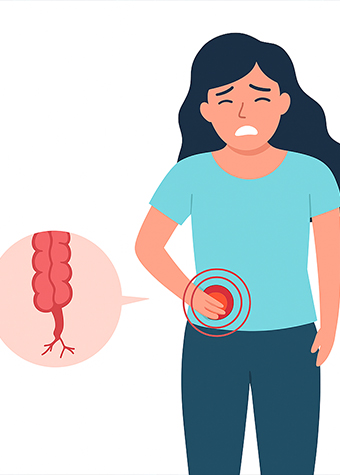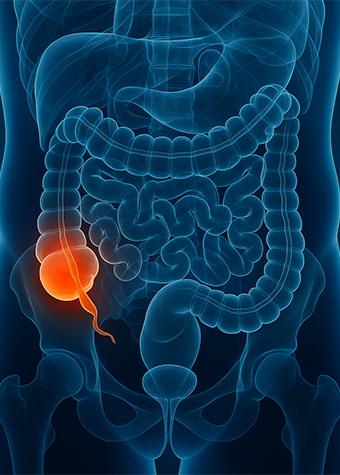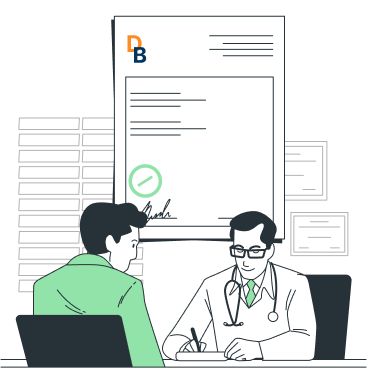Doctors
What is an Appendectomy (Appendicitis Surgery)?
Appendectomy is a surgery that is performed to remove an infected or inflamed appendix. Appendicitis doctors usually suggest this procedure to patients suffering from acute appendicitis as this condition tends to advance more quickly. Individuals with acute appendicitis face a significant risk of their appendix rupturing.This may cause the infection to spread to other parts of the body, which can prove to be deadly. In cases of chronic appendicitis, the pain is not much severe, hence surgery is advised as per the patient’s condition.
Types of Appendicitis Surgery

Open Appendectomy
This is a procedure that helps remove the appendix through a large incision ranging from 5 to 10 centimetres in the lower right abdominal area. Once the procedure is complete, the surgeon will close the surgical site with stitches.

Laparoscopic Appendectomy
A laparoscopic surgeon for appendicitis will make two to three small incisions through which the laparoscope, a thin tube with a light and camera, will get inserted to check inside the abdomen. The appendix is then located and removed, following which the incisions are closed with stitches and covered with a dressing.
Types of Appendicitis Surgery

Open Appendectomy
This is a procedure that helps remove the appendix through a large incision ranging from 5 to 10 centimetres in the lower right abdominal area. Once the procedure is complete, the surgeon will close the surgical site with stitches.

Laparoscopic Appendectomy
A laparoscopic surgeon for appendicitis will make two to three small incisions through which the laparoscope, a thin tube with a light and camera, will get inserted to check inside the abdomen. The appendix is then located and removed, following which the incisions are closed with stitches and covered with a dressing.
Frequently Asked Questions
Pain may be less severe than the previous episode of chronic appendicitis but other symptoms may include changes in bowel habits, nausea, vomiting and fever.
In some cases of chronic appendicitis, antibiotics alone may manage the condition. However, for acute appendicitis, surgery is usually necessary to remove the inflamed appendix and prevent complications.
The fastest way to treat appendicitis is through surgery. Removing the appendix entirely resolves the issue, and the procedure usually takes about 30 to 45 minutes.
Patients stay in the hospital for 1 to 2 days after an appendectomy, though this can vary based on the type of surgery and individual recovery. Laparoscopic appendectomy often allows for a shorter hospital stay compared to open surgery.
The cost of appendix surgery may vary based on the experience of the surgeon, the type of surgery, hospitalisation cost and other additional costs like the cost of medications administered during the procedure and so on.
Yes, appendicitis surgery can cause some discomfort, especially in the immediate postoperative period. However, pain is usually managed with medications prescribed by the doctor, and most patients experience significant relief as they recover.
You may experience some temporary changes in bowel habits, but these usually resolve as you recover from the surgery.
If you experience severe pain, persistent fever, excessive swelling, or unusual symptoms such as nausea or vomiting after appendicitis surgery, contact the doctor immediately. These symptoms may indicate complications such as infection or an adverse reaction to the surgery that requires immediate medical attention.
What is an Appendectomy (Appendicitis Surgery) ?
Appendectomy is a surgery that is performed to remove an infected or inflamed appendix. Appendicitis doctors usually suggest this procedure to patients suffering from acute appendicitis as this condition tends to advance more quickly. Individuals with acute appendicitis face a significant risk of their appendix rupturing.This may cause the infection to spread to other parts of the body, which can prove to be deadly. In cases of chronic appendicitis, the pain is not much severe, hence surgery is advised as per the patient’s condition.
The two common types of appendicitis have been explained in detail below:
Acute Appendicitis:
This type of appendicitis develops suddenly and is characterised by severe and rapidly worsening symptoms. It requires prompt medical attention and often leads to surgery if left untreated.Chronic Appendicitis:
This type involves recurring or persistent inflammation of the appendix that can last for weeks or even months. Symptoms may be less severe and can come and go, making it more difficult to diagnose compared to acute appendicitis.

Symptoms of Appendicitis
Have a look at the most common symptoms of appendicitis.
- Pain that starts from the belly button and radiates towards the lower right side of the abdomen
- Indigestion
- Loss of Appetite
- Feeling of nausea or vomiting
- Changes in bowel habits
- Fever

Risk Factors of Appendicitis
The risk factors for appendicitis include:
.jpg)
Importance of seeking immediate medical attention for Appendicitis
It is of utmost importance to reach out to an experienced doctor after receiving an appendicitis diagnosis. On the other hand, if you notice any of the aforementioned symptoms, you can seek immediate medical attention. This will prevent the appendix from getting further inflamed and eventually bursting. If immediate treatment is not sought, then the bursting of the appendix may cause the infected bacteria to flow into the abdominal cavity and lead to complications that may be life-threatening.

The Process of Appendicitis Treatment
Diagnosis And Evaluation
If you experience any of the above-mentioned signs of appendicitis, you can reach out to our doctor, and they will diagnose the condition in the following ways:
- The doctor may ask you to identify the pain area of appendicitis, after which they will examine for tenderness and pressure sensitivity.
- Depending on your condition, the doctor may recommend a blood test and urinalysis to check the risk of other complications.
Based on these tests, the doctor will suggest other imaging tests like X-rays, CT scans, MRIs, or ultrasounds.
Procedure of Appendectomy
Laparoscopic acute appendicitis surgery or laparoscopic chronic appendicitis surgery usually involves the following steps:
- The surgeon will put you under general anaesthesia to prevent pain or discomfort during the laparoscopic appendectomy.
- They will make small incisions in your abdomen to access and remove the appendix. To get a clear view, the surgeon will insert a cannula and inflate your abdomen with harmless CO2 gas.
- Next, the surgeon will insert a laparoscope through one of the incisions to perform the procedure. After locating the appendix, the surgeon will detach it from the intestine.
- Once the appendix is removed, the surgeon will remove the laparoscope and other instruments, then close the incisions using sutures.
If laparoscopic removal is not feasible, the surgeon may switch to an open appendectomy due to reasons such as:
- Severe infection or abscess
- Perforated appendix
- Obesity
- Dense scar tissue from prior surgeries
- Bleeding problems, if any, arise at the time of operation
- Difficulty visualising the organs with the laparoscope
Other Appendicitis Treatments
The only alternative to treating appendicitis with surgery is antibiotic medication. However, this approach is effective only for chronic appendicitis, where the condition recurs frequently. In cases of chronic appendicitis, the condition does not progress to the point where surgery is required and can usually be managed with medication alone.
Why Choose Dactar Babu for Appendix Surgery?
You can choose Dactar Babu for Appendicitis surgery for the following reasons.
- We offer a comprehensive approach for your appendicitis treatment.
- Our team of highly skilled appendicitis doctors perform laparoscopic surgery for appendicitis with precision.
- We guarantee a smooth and quick recovery following the procedure.
Contact Dactar Babu for connecting with our leading laparoscopic surgeons.
Preparation For Appendectomy
Follow this advice to prepare for your appendectomy procedure:
- Like most surgical procedures, you must avoid eating or drinking for at least 12 hours before appendicitis laparoscopic surgery. An empty stomach allows the doctor a clearer view of the abdominal cavity, ensuring a safer and more effective procedure.
- Consult the doctor if you are on any medications, as they will advise how to manage them before and after the surgery.
- Certain medications, such as aspirin, blood thinners, vitamin E, and arthritis drugs, must be avoided for at least a week before surgery.
- Inform the doctor if you have a history of bleeding disorders or allergies to prevent complications during the procedure.
- You may need to undergo tests like blood tests or chest X-rays to ensure there are no risks during surgery.
- If you plan to take a bath, do so before the surgery, as doctors recommend keeping the surgical area dry afterwards to help prevent infection and promote healing.
Expectations After An Appendectomy
You can expect the following after an appendicitis surgery.
- After the appendix operation, you may experience some pain and discomfort after the effects of the anaesthesia completely wear off.
- Once the anaesthesia has worn off and your blood pressure, breathing, and pulse rate are stable, you will be moved to the recovery room. Depending on your overall condition and the specifics of the procedure, you will be prepared for discharge from the hospital.
- You will need to keep the surgical area dry and clean for the next few days to prevent infection.
- In the first few days following the appendectomy, you may experience moderate pain around the abdomen. The doctor will prescribe painkillers to manage the pain and antibiotics to prevent infections.
Key Advantages of Laparoscopic Appendectomy Procedure
Doctors often prefer laparoscopic appendectomy due to its advantages over open surgery:
- Laparoscopic surgery uses 1 to 3 small keyhole-sized incisions instead of a single large incision, resulting in less damage to the skin tissues.
- Smaller incisions reduce the risk of bleeding and infection both during and after the procedure.
- The minimal incision size leads to less postoperative pain.
- Recovery is faster because the small incisions heal more quickly than a large incision.
- Patients can often be discharged from the hospital on the same day.
- There are generally fewer restrictions on physical activities after laparoscopic appendectomy.
Recovery Instructions After Appendectomy
Some of the recovery instructions that you must follow after appendicitis surgery are as follows.
-
Adhere to Medical Instructions:
It is essential to follow the doctor’s instructions carefully, including the administration of prescribed medications and adhering to activity restrictions.
-
Manage Pain Effectively:
Have prescribed pain medications as directed to maintain comfort and facilitate a smooth recovery process.
-
Ensure Adequate Hydration:
Consuming ample fluids is essential to support bodily functions and aid in the recovery process.
-
Start with an Easy-to-Digest Diet:
Begin with easily digestible foods and progressively reintroduce regular diet items. It is advisable to avoid heavy, spicy, or fatty foods initially.
-
Prioritise Rest and Avoid Physical Strain:
Sufficient rest is vital. Refrain from engaging in strenuous activities or heavy lifting until authorised by the doctor.
-
Maintain Incision Care:
Keep surgical incisions clean and dry. Monitor for any signs of infection, such as increased redness, swelling, or discharge, and report these to the doctor.
-
Attend Follow-Up Appointments:
It is important to attend all scheduled follow-up visits to monitor your recovery and address any emerging concerns.
-
Seek Medical Advice if Necessary:
Contact the doctor if you experience any unusual symptoms, such as severe pain, fever, or difficulty in movement.
-
Maintain Good Hygiene Practices:
Adhering to proper hygiene practices is important to minimise the risk of infection and to support recovery.
Recovery Time After Laparoscopic Appendicitis Surgery
Appendicitis laparoscopic surgery recovery time is about 1 to 3 weeks. Most patients can return to work and resume daily activities within a week. By following the doctor’s instructions carefully, you can achieve a full recovery within the expected appendicitis operation recovery time.
The results of an appendectomy are immediate, as patients generally experience relief from symptoms right after the surgery. Since the appendix is removed during the procedure, there is no chance of appendicitis recurring.
Our Patient Love Us
Get in Touch
Tell us about your disease and Dactar Babu will get the best treatment option for you.


.png)






